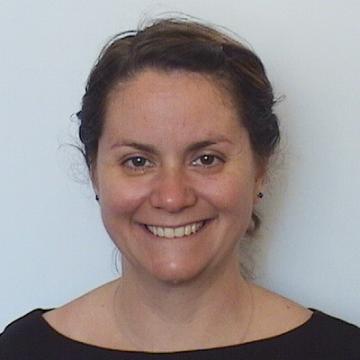What inspired you to pursue a nursing degree?

I was working as a health assistant for a women's health NP, and I really enjoyed interacting with the patients and being part of their care. Also, since I was a young child, I was inspired by my grandfather to go into healthcare because of his passion for treating the underserved populations in the Florida Keys.
What do you feel is unique about the nursing program at Simmons?
Simmons is very student-centered — I enjoyed that as a student and now as a faculty member. The faculty are personable, and students see them as mentors in their professional careers. It’s a testament to how great our program is that so many of our nursing students want to continue their education with us. We have a significant number of alumnae/i in the online DNP program (Doctor of Nursing Practice).
Also, the scholarly inquiry project allowed me to draw on what I learned in my bachelor of science in nursing (BSN) at Simmons into my master’s of science in nursing (MSN). Many nursing master's programs include evidence-based practice, but our program takes it to the next level with the application through individual scholarly projects. It helps our students become leaders in their profession.
[Simmons' MSN program] helps our students become leaders in their profession.
Do you have a favorite class to teach?
Honestly, I don’t — I love each of them for different reasons. My favorite part of each course is the 'Ah-ha!' moment for students, where they come to appreciate what they’re learning and how it will help them in practice and professionally.
What is unique about your nursing students?
The online nursing programs attract students from across the nation and the world. It’s really great to get that perspective. When you go to a brick and mortar school, you’re engrossed in that healthcare system — that’s where you do all of your clinicals and learn how healthcare is provided — but you don’t see how it’s provided in the midwest or California or in another country.
In the online classroom, we gain a greater understanding of the diversity of healthcare, including the challenges in cities and rural areas. This offers students a greater perspective of wanting to better the world and consider population health as well as the patient in front of them.
Also, there’s still not a universal agreement across the nation of what an NP does. Having different perspectives in the classroom sheds light on the potential limitations there might be to their practice, given their location. Those with practice limitations can advocate for practicing to the full extent of their education and licensure.
As an alum, why did you choose to teach at Simmons?
I’ve gone to many universities and earned several degrees, but Simmons has always been close to my heart. The undergraduate program, with its focus on women in leadership, was very powerful for me. I felt very connected to the community.
After completing my master’s degree, I lived in Florida and attended a Simmons alumnae/i luncheon where I heard that they were creating an online nursing program. I immediately wanted to be a part of it. I knew that Simmons would take all of the great values they have on the ground and put them into their online program, and they have done just that. I reached out to my former professors, who remembered me, and that is how I got into teaching.
I knew that Simmons would take all of the great values they have on the ground and put them into their online program, and they have done just that.
How are you preparing your nursing students for today’s unique challenges?
Students in the online DNP program are already practicing nurse practitioners. They have persevered in a demanding program to become Nurse Practitioners while dealing with swift changes in their daily practice, with more patients and a different level of care. It’s a great challenge, but they work hard and stay focused.
Faculty highlight compassion and understanding in their students, who are being stretched so thin. We deliver a quality education and support our students so that they continue to excel in the program. We’ve also brought in real-life examples: how do you understand evidence from clinical trials? How do you deal with a novel virus? It’s vital to talk through these current issues.
Are you conducting any research?
Currently, I am working with Dr. Carmen Harrison on exploring African American/Black women's sexual health and the relationship or differences among demographics, social determinants of health, condom negotiation, sexual and reproductive empowerment.
What advice do you have for nursing students?
Look at nursing as a passion and a career. It's not a job where you can clock in and out — it stays with you — it molds who you are. Be ready to take on other people’s experiences as you will be integrated into their lives. It’s very rewarding, if sad at times — but in the end, you’re left feeling like you’ve done something in the world.

